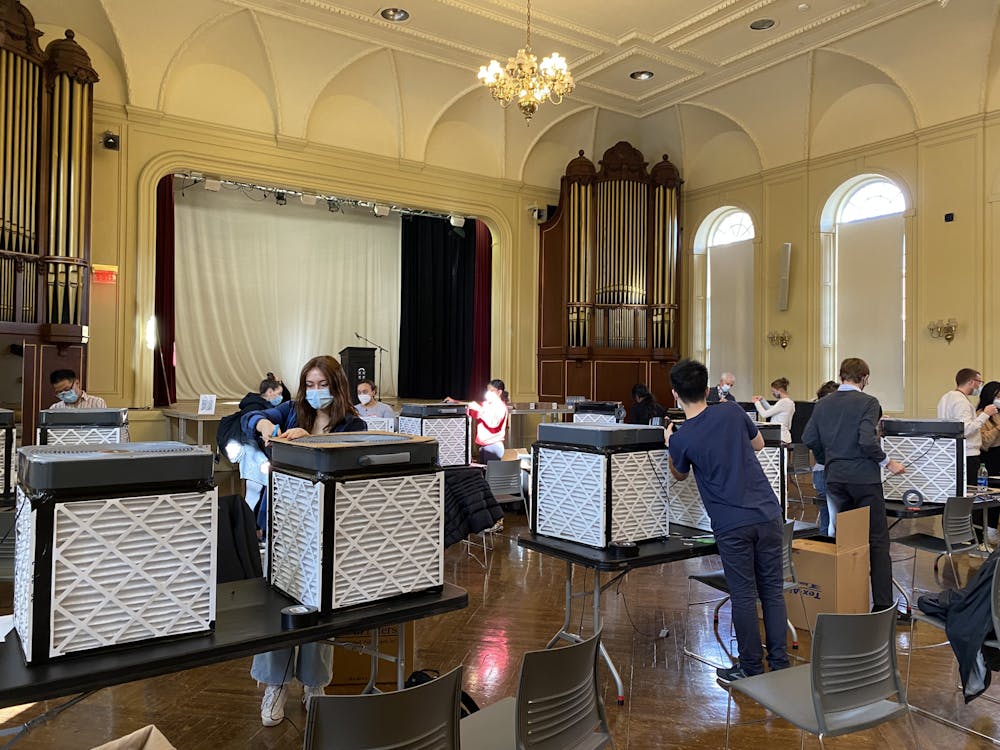The School of Public Health hosted a Corsi-Rosenthal Cube air cleaner building event Friday, Nov. 19, during which University students and staff gathered at Alumnae Hall to construct air filtering cubes that will be placed around campus in the next couple weeks.
The Corsi-Rosenthal air cleaner was originally designed to help prevent the spread of COVID-19 by filtering virus particles from the air, The Herald previously reported. Creators Jim Rosenthal, CEO of Air Relief Technologies, and Richard Corsi, dean of engineering at the University of California, Davis, never patented the cube. Rather, they encouraged people to build and personalize their own filters as a relatively low-cost way to combat COVID-19 spread.
Since Nov. 1, the University has been placing these filters in SPH classrooms as part of a study regarding their effectiveness in removing particles and chemicals from the air, The Herald previously reported.
“We made the first Rosenthal Cubes as a pilot within the School of Public Health,” said Kathryn Kempton Amaral, senior director for Public Health Leaders at the SPH, who helped organize the event along with Associate Director for Dean’s Initiatives and Special Projects Mahrokh Irani. “I wanted to bring this (event) to the broader campus to get students and staff involved.”
Student and staff attendees worked on building the Cubes in groups of two or three. Instructors circled the room, answering questions, giving tips and providing encouragement to the builders.
Each group first taped four MERV-13 air filters together in a square shape to form the base. A piece of cardboard was taped to one of the open sides of the square to serve as the bottom of the Cube. A box fan was then taped to the top, and all gaps in the Cube were covered with cardboard or tape.
As students finished their boxes, they were removed from the building for future placement around campus.
Dean of the School of Public Health Ashish Jha hopes these student- and staff-made Cubes will “augment” the work the University has already done in updating its filtration systems since the start of the pandemic. In addition to the health benefits the Cubes provide, their do-it-yourself assembly serves as an educational and empowerment tool for the Brown community, Jha said.
“We could go out and buy air filters, but I just feel like it’s a lot more fun to build” them, Jha said. “(Building) helps people understand how COVID is spread, that COVID really is an airborne disease and how filtration actually can really reduce the burden of that disease.”
The self-assembly aspect helps people take their safety into their own hands, Jha added. “You can actually take control of your air environment … (and) improve your own dorm room or classroom or conference room, wherever you’re going to be. I think that empowerment is super important.”
“It’s really fun to be able to put something together that you know is going to serve a good purpose,” said participant Abby Healy ’23, an e-board member of the Public Health Departmental Undergraduate Group.
The opportunity to “implement public health strategies that are cutting edge … and make a great impact in the local community at Brown” was rewarding, event participant Noah Soutier ’22 said.
“We sit in class and hear about all this great work being done, but I’m always looking for options to dip my toes in the water and find ways to do it myself,” Soutier added.
In the future, the SPH hopes to expand implementation of the Corsi-Rosenthal Cubes into the Providence Public Schools and the greater Providence community, Jha said.
Ennie Zhu ’23 said she hopes her work building the boxes will ultimately have a positive impact. “These are a great way that Brown can give back to the community,” she said.





